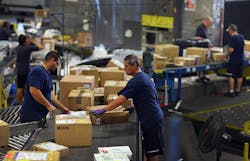The talent shortage in the logistics industry is not limited to truck drivers. Higher supply chain volumes and greater operational complexities are creating increased demand for logistics professionals at every level of the supply chain, from the front lines to senior executives, according to a new study form the University of Tennessee, Knoxville's, Haslam College of Business.
A new study, released on May 11, shows that this managerial skill set is already scarce in the supply chain industry and that most executives struggle to strategically recruit for their talent gaps. The report offers some best practices from benchmark companies to analyzing, finding, recruiting, developing and retaining talent that meets a company's long-term supply chain needs.
The report suggests that executives source talent like any other resource. Raw talent should be procured via systems like internship programs and relationships with top universities, while existing labor reserves are further refined internally through mentorship and educational opportunities. The exception to this premise is the report's emphasis on diversity in recruitment, which it advocates at all stages of the talent management spectrum.
One best practice is that supply chain professionals must think beyond their technical role, contextualize their contribution to the business, manage outside vendors and possess communications skills that transcend global cultural barriers, the report concludes. UT's research shows that this managerial skill set is already scarce in the supply chain industry and that most executives struggle to strategically recruit for their talent gaps.
"More than 90% of CEOs recognize that they need to change their strategies for managing talent," said Shay Scott, director of UT's executive MBA program in supply chain management and co-author of the report.
"We want to establish, first and foremost, that supply chain talent is a critical priority that must be addressed now,” added Scott. “ In addition to addressing the truck driver shortage, this report gives executives a strategy to begin building toward long-term solutions for whatever talent gap they have within their supply chains — from front-line staff to high-level executives."
Click here to read the full report.
